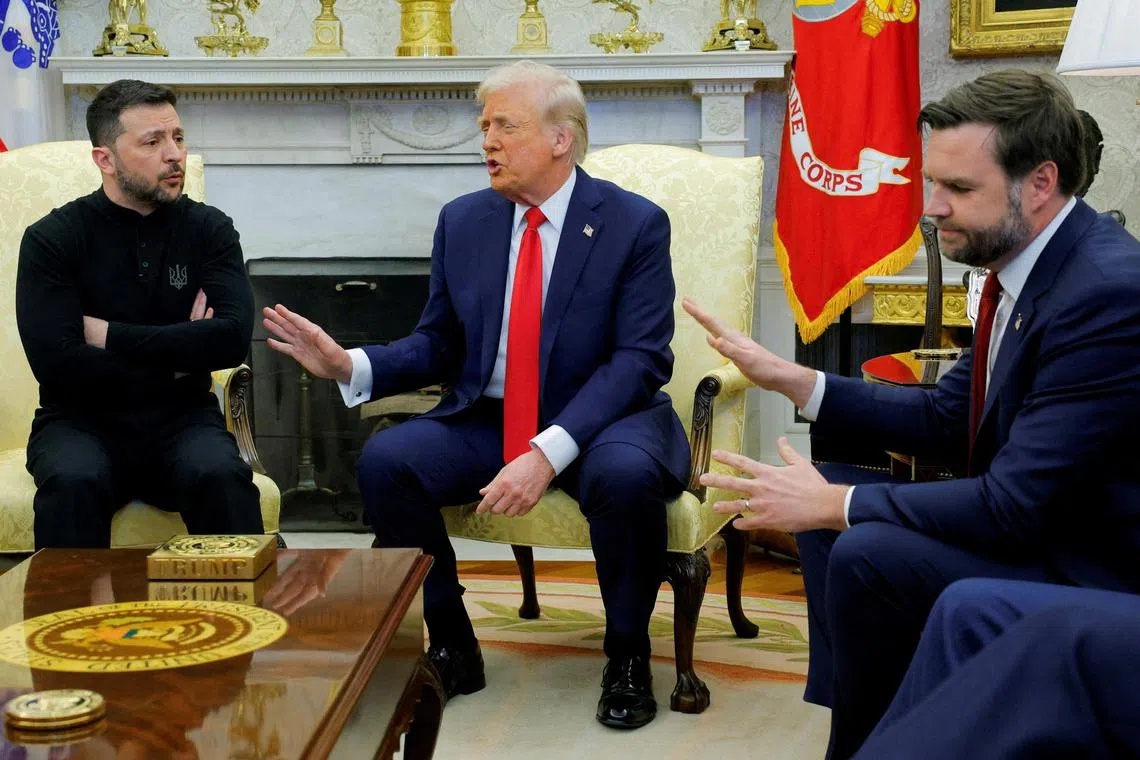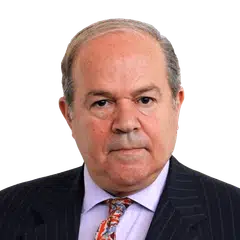News analysis
Trump’s shabby treatment of Zelensky draws dismay, shows lack of basic courtesy
Sign up now: Get ST's newsletters delivered to your inbox

US President Donald Trump (centre) meeting with Ukrainian President Volodymyr Zelenskiy (left) as US Vice-President JD Vance reacts at the White House.
PHOTO: REUTERS
Follow topic:
LONDON – European leaders have reacted with dismay to the public spat between Ukrainian President Volodymyr Zelensky and his US counterpart Donald Trump, which unfolded before the world’s TV cameras in the White House on Feb 28.
“Ukrainians are the attacked people,” French President Emmanuel Macron told reporters on March 1. “They are fighting for their dignity, their independence, their children and the security of Europe. These are simple things, but it is good to remember them in times like these,” Mr Macron added in a coded reference to the events in Washington.
“Be strong, be brave, be fearless. You are never alone, dear President @ZelenskyyUa,” wrote Dr Ursula von der Leyen, the president of the European Commission, the European Union’s executive body, on her X social platform posting, in a more explicit rebuke of President Trump’s behaviour.
As seen from Europe, the extraordinary confrontation that unfolded in the White House destroyed a week of delicate diplomacy by the leaders of Britain and France, which was designed to reduce Western tensions.
The angry exchanges in the Oval Office
The consequences of all this for Ukraine will be grim.
The Feb 28 trip to Washington – Mr Zelensky’s first since Mr Trump was sworn into office on Jan 20 – was always going to be a difficult mission.
Mr Trump has steadfastly refused to acknowledge that the present Ukraine war is the result of Russia’s full-scale invasion of Ukrainian territory unleashed in February 2022.
He has also made disparaging public remarks about Mr Zelensky, branding his Ukrainian counterpart a “dictator”.
However, European leaders worked hard to minimise the risks of a public spat between the notoriously mercurial Mr Trump and Mr Zelensky.
Macron and Starmer concerned about Ukraine’s security
Mr Zelensky’s trip to Washington came at the end of a week during which Mr Macron British Prime Minister Keir Starmer
The French and the British leaders claimed to support Mr Trump’s diplomatic initiative to normalise relations with Russia but concentrated on the narrower subject of ensuring Ukraine’s security after the fighting stopped.
While the US leader never explicitly pledged to contribute American troops to Ukraine’s future protection, Mr Trump appeared to be in a jovial mood, backslapping in the Oval Office with President Macron and jokingly admiring Prime Minister Starmer’s English pronunciation.
So, most European diplomats assumed that his American host would be less prickly when Mr Zelensky made the same journey to Washington at the end of the working week.
The outlook appeared brighter after President Trump told a journalist that he no longer remembers calling Mr Zelensky a “dictator”.
The prospects looked even better as Mr Zelensky agreed to sign a new treaty in Washington, granting US companies special rights to explore Ukraine’s rare earth mineral deposits.
Mr Trump – who now regularly but mistakenly calls them “raw” earth minerals – hailed this agreement as an example of how the US would “recover” the money it spent helping Ukraine defend itself.
The ceremonial signing of this mining treaty was designed to please Mr Trump by providing him with a photo opportunity, confirming the American leader’s supposedly unbeatable negotiating skills.
Yet all this came to nought within minutes in the Oval Office.
Should Zelensky have controlled himself?
After a shouting match during which both President Trump and Mr J.D. Vance, his deputy, furiously accused Mr Zelensky of being “ungrateful” and “disrespectful”, Ukraine’s leader left the White House without signing the deal.
In private, some European politicians – and quite a few inside Ukraine – believe that Mr Zelensky should have avoided the bait of Messrs Trump and Vance and controlled himself better.
The example of France’s President Macron – a master in turning Mr Trump’s taunts into jokes – is often given as the one the Ukrainian leader should have followed.
Trying to hold a fundamental debate before the cameras by contradicting a US president addicted to flattery was a mistake.
Still, Mr Zelensky’s patience was sorely tested, and he exercised incredible restraint.
He sat quietly as Mr Trump repeated falsehoods, such as the claim that the US gave Ukraine US$300 billion (S$405 billion) in “grants” while the Europeans allegedly gave only US$100 billion in “loans”.
The actual figures are US$119.2 billion for total US aid against US$137.9 billion for Europe, and the claim that the Europeans only lent rather than gave money to Ukraine is a lie.
Mr Zelensky also did not demur when Mr Trump implied that the fighting was merely due to personal animosities between the Ukrainian and Russian leaders or that the war “should have never happened” and was, therefore, a matter of choice rather than necessity.
Both assertions are deeply offensive to Ukrainians who lost relatives in defending their country’s independence.
In reality, the Ukrainian leader was the victim of an ambush by Vice-President Vance, who deliberately lowered the tone of the discussions and directly attacked Mr Zelensky for allegedly supporting Mr Trump’s opponents in the last US electoral campaign.
The fact that Mr Vance himself recently interfered in the domestic politics of Germany by publicly lecturing that country’s leaders about their supposed need to reach an accommodation with the German far-right movement was conveniently forgotten; what’s good for the goose is, apparently, not good for the gander.
Possible backlash on Trump and Vance
Yet, as seen from Europe, the biggest problem with this entire shabby White House spectacle is what it says about the attitude of the Trump presidency.
Mr Trump contemptuously dismissed the Ukrainian leader, telling him he “had few cards” to play with.
He praised his relationship with Russia’s President Vladimir Putin, claiming that the US and Russian leader “went through a hell of a lot” together in opposing claims that Russia influenced the outcome of previous US presidential elections.
For Ukraine and Europe, the furious exchange in the Oval Office is a disaster, raising the prospect of a complete cut-off in US aid.
“Either you sign a (peace) agreement, or we’re out,” Mr Trump said to Mr Zelensky towards the end of their exchanges, in what is an ominous threat.
The potential end of US military support will not only deprive Ukraine of its most important source of weapons, but also impede the Europeans’ ability to help Ukraine’s military, even if they wanted to.
Europe does not have the array of weapon platforms and depth of ammunition stocks required to continue the war. Nor does it have the satellite-based reconnaissance and logistical capabilities needed for the international deliveries that have kept Ukraine fighting.
Furthermore, once US support is withdrawn, Russia’s military would be even more emboldened to fight, with the sure knowledge that Ukraine’s total defeat is no longer a concern in Washington.
However, cutting off Ukraine completely will also backfire on US interests. Cornered and isolated, President Zelensky could refuse to sign any deal negotiated between Mr Trump and Russia.
Although this may well spell a total Ukrainian defeat, this outcome could well go down in history as another example of a US strategic disaster, similar to the withdrawal from Vietnam or the rush of US troops out of Afghanistan in 2021.
Either way, Mr Trump’s much-trumpeted claim to be a brilliant negotiator would lie in tatters.
Perhaps just as significantly, President Trump’s discourteous behaviour will further hit America’s already damaged global reputation by creating an image of a powerful country ready to bully its enemies and allies alike, with no interest in respecting even the most basic decencies.
There are few examples in modern diplomatic history of a visiting head of state being treated in public as degradingly as President Zelensky was.
“What you are doing is very disrespectful to this country”, Mr Trump complained to Mr Zelensky during their disastrous meeting.
However, it could be Messrs Trump and Vance who may be remembered as the actual detractors of their nation’s global standing.
Jonathan Eyal is based in London and Brussels and writes on global political and security issues.


